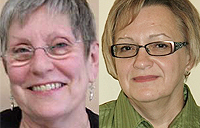York sociology Professor Deborah Davidson and bereaved mom Helena Stahlswill talk about maternal grief and what mothers the need from others to help assuage their grief at the next Women’s Mental Health and Wellbeing Speaker Series.
The talk will take place Wednesday, Jan. 23, from noon to 1pm, at 280N York Lanes, Keele campus. The event is sponsored by the Office of Echo’s Chair in Women’s Mental Health Research. RSVP by Jan. 18 at owhchair@yorku.ca.
Both speakers have personal experience with loss. For Davidson of the Faculty of Liberal Arts & Professional Studies, her perinatal losses have driven much of her research. She met Stahls, who lost her adult child  Donna to suicide, through Bereaved Families of Ontario Halton-Peel. Davidson was chair of the Professional Advisory Committee, a peer facilitator and a facilitation trainer, while Stahls was the programming coordinator at Bereaved Families, as well as a volunteer at the Crohn’s & Colitis Foundation of Canada.
Donna to suicide, through Bereaved Families of Ontario Halton-Peel. Davidson was chair of the Professional Advisory Committee, a peer facilitator and a facilitation trainer, while Stahls was the programming coordinator at Bereaved Families, as well as a volunteer at the Crohn’s & Colitis Foundation of Canada.
Deborah Davidson
“My part of the presentation will be on maternal grief – what it looks like to others, how it is experienced by grieving moms, and what mothers need from others to help assuage their grief,” says Davidson, whose work is focused in the areas of health, motherhood and diversity. “I will suggest ways others can validate loss and provide the kinds of social supports needed.”
Stahls will read a letter she wrote to her daughter, who suffered from bipolar  disorder and Crohn’s, after her death. She will also describe the kinds of things she has done in Donna’s memory, which includes raising more than $120,000 for the Crohn’s & Colitis Foundation from her annual fundraising event “Just Gotta Skate”.
disorder and Crohn’s, after her death. She will also describe the kinds of things she has done in Donna’s memory, which includes raising more than $120,000 for the Crohn’s & Colitis Foundation from her annual fundraising event “Just Gotta Skate”.
Helena Stahls
“Helena has presented to my classes and we have co-presented at least one academic conference and written an article in an academic journal together,” says Davidson, who also does research on the use of tattoos as memorials.
“Both Helena and I have memorial tattoos as a way of keeping our loved ones with us and as a way to open conversation about death – the proverbial elephant in the room, shrouded in even more silence when death is by suicide. People are often uncomfortable around grieving persons and may either shy away altogether or say things that are particularly unhelpful. We wish to open conversation and suggest what is more likely to be helpful than hurtful.”
For more information about the 2012-2013 Women’s Health & Mental Wellbeing Speakers Series, click here.


